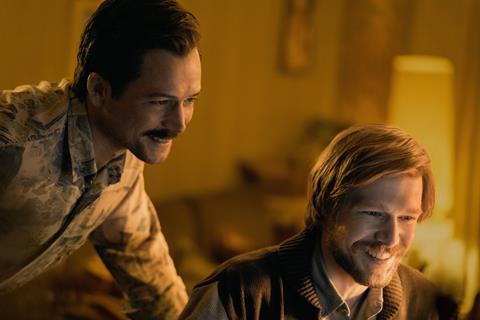Taron Egerton fights for the right to bring Tetris to the world in Jon S. Baird’s uneven thriller

Dir: Jon S. Baird. US. 2023. 118mins
Classic video games have sometimes travelled a bumpy road on their way to reaching the masses, but none has been as fraught as the one faced by Tetris. Based on a true story, Tetris the film is a Cold War thriller that shines a spotlight on a forgotten piece of 1980s history in which disputed licensing rights resulted in international intrigue and literal life-or-death stakes, as competing capitalists journeyed to the Soviet Union to gain permission to sell the highly addictive puzzle game. Taron Egerton brings a desperate energy to his role as one of those entrepreneurs who discovers how business was conducted behind the Iron Curtain. But director Jon S. Baird fumbles the narrative’s tricky tonal balance, resulting in a glib, convoluted film that is never as engrossing as the game these characters are fighting over.
Tetris is the opposite of its namesake game: the pieces don’t fit
Premiering at SXSW before releasing on Apple TV+ on March 31, Tetris should appeal to gamers as well as those with acute Cold War nostalgia. although disappointment is in store for viewers hoping for a film that reveals how the game was created. Instead, this is a thriller that involves a lot of legal wrangling and tense negotiating.
In 1988, a Dutch-born game developer named Henk Rogers (Egerton), is living in Tokyo with his family and searching for a hit to keep his fledgling company afloat. That’s when he learns about Tetris, an ingeniously simple puzzle game that is wildly popular in the Soviet Union which involves manipulating falling shapes so that they form complete rows.
Believing he has secured the valuable international rights for different gaming formats — including Nintendo’s forthcoming Game Boy console — Henk is devastated to find out that other entities also claim they control those licences. To get the matter resolved, he flies to Moscow, meeting Tetris creator Alexey Pajitnov (Nikita Efremov), who is at the mercy of Elorg, the government’s computer-technology organisation that will ultimately determine the rights issues. Squaring off with other suitors, including London rival Robert Stein (Toby Jones), Henk has bet his life savings on acquiring Tetris – but his actual life may be in danger once the KGB begins pursuing him.
Baird (Stan & Ollie) leans into the bizarreness of this tale’s stranger-than-fiction premise while affectionately mocking the period’s dated tech and pop songs. (The playfulness extends to establishing shots that are presented as 8-bit graphics, while Lorne Balfe’s score mimics the cheesy-futuristic keyboard style of ‘80s sci-fi soundtracks.) But Tetris is most engaging early on, when screenwriter Noah Pink illustrates how startling Tetris was at the time — and also what was revolutionary about home gaming consoles like Nintendo. Henk’s enthusiasm about the potential of Tetris seems completely justified: this is the beginning of an exciting, lucrative new age.
Unfortuantely, as Tetris shifts into a drama about the game’s complicated rights issues, Baird struggles to make those legal wranglings absorbing. Production designer Daniel Taylor and cinematographer Alwin Kuchler emphasise the drudgery of Soviet bureaucracy through the drab decor and flat lighting in the Moscow government offices where Henk tangles with middle men like the dour Nikolai Belikov (Oleg Stefan). But rather than finding the humour in this ridiculously labyrinthine process, Tetris feels muddled and disjointed. It does not help that Henk’s competitors are not well-drawn, with Roger Allam playing the haughty British media mogul Robert Maxwell and Anthony Boyle as the man’s spoiled son Kevin.
The film’s central relationship turns out to be between the charismatic Henk and the reserved Alexey, and Egerton and Efremov have a nice rapport despite their one-dimensional characters. Because Henk spent time in the US as a child, Tetris positions him as the typical American — brash, ambitious, foolhardy — while Alexey is meant to represent a mournful, uncertain Soviet Union on the precipice of collapse. That political backdrop provides welcome context, but Baird never gives the material enough heft for us to realy appreciate how the battle over Tetris is a microcosm for a shifting world order.
The problems multiply once the smooth-talking Henk realises that he’s being monitored by authorities and has few allies. (Sofia Lebedeva is nicely enigmatic as Sasha, his interpreter, who may not be trustworthy.) Tetris wants to create an atmosphere of increasing dread with the KGB trying to intimidate Henk — even threatening his family in Tokyo — because Soviet higher-ups don’t want him to get the rights. But as the narrative eventually gets cluttered with car chases and anxious getaways — featuring some of the same cutesy video game graphics that had been incorporated earlier — the picture’s abrupt pivot to action-thriller is unconvincingly executed. Wanting to be both irreverent and gripping, Tetris is the opposite of its namesake game: the pieces don’t fit.
Production companies: Cloudy, Unigram
Worldwide distribution: Apple TV+
Producers: Matthew Vaughn, Gillian Berrie, Claudia Vaughn, Len Blavatnik, Gregor Cameron
Screenplay: Noah Pink
Cinematography: Alwin Kuchler
Production design: Daniel Taylor
Editing: Martin Walsh, Colin Goudie, Ben Mills
Music: Lorne Balfe
Main cast: Taron Egerton, Nikita Efremov, Sofia Lebedeva, Anthony Boyle, Roger Allam, Tony Jones
















![[L-R]: Amanda Villavieja, Laia Casanovas, Yasmina Praderas](https://d1nslcd7m2225b.cloudfront.net/Pictures/274x183/6/4/1/1471641_pxl_20251224_103354743_618426_crop.jpg)







